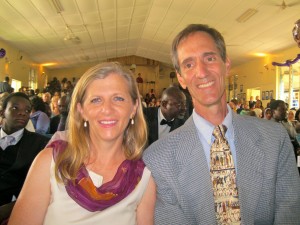There are certainly many ways one can choose to express his or her faith in public. Certainly, during this political season, there is no shortage of judgments made on the character of individuals based on the religious ideals they may or may not possess. At every turn it seems we are asked to pledge allegiance to those “on our side” or disown someone because they may not believe exactly as we do. To be a bridge-builder and peace-keeper under these conditions can be difficult.
I owe a great deal of the clarity I have in my calling and the emphasis I place in my ministry on building bridges of respect, honor, and relationship, to the model set for me by a youth pastor I shared with other young people at First Presbyterian Church of Puyallup, Washington, in the late 1980s to 1991. Dave Pederson, and wife Julie, described themselves as “Presbycatalutapalians”—a blend of Presbyterian, Catholic, Lutheran, and Episcopalian.
Dave served as youth pastor in the Presbyterian Church I attended Wednesdays for youth group with my best friend, Scott Carden. Dave also taught at a Catholic elementary school in Puyallup. I forget where, exactly, the Lutheran and Episcopalian influences came in, but one thing was clear: the Pedersons loved God and viewed service to God as their life’s mission.
Mission work has been something I have always been drawn to. It was part of why I liked Dave and Julie almost immediately. They put their faith into action in service to others. In 1991, that commitment led to a calling: to teach and serve as missionaries overseas in China. From there, Madagascar. Then, the African mainland. They are currently serving in Nairobi, Kenya. We connect every few years when they are back in the States, but mostly I just follow what they are up to through the letters we get as supporters of their ministry.
If I were to guess, Dave and Julie would be reticent to claim that they passed on any great insight or teaching during their time in ministry with me as one of their charges. I would disagree. In the fashion that good theology is “caught” as much as it is “taught,” here are a few gems I picked up from their example:
First, everyone is an individual for whom Christ lived, died, and rose again to bring new life and hope. My personal feelings about them matter not a whit in this regard. If God loved them that much, I should do more than just tolerate them… I should seek to love them as well.
Second, you can build bridges of relationship and trust through hard work done humbly. Look to elevate the status of those around you as you work alongside them. Become an encourager of the best in others, and you’ll find that many people are happy to return the favor.
Third, respect is a two-way street… if you don’t want to be treated as a caricature, don’t resort to viewing others this way. Refuse the short-cuts of prejudice, racism, and sexism. Think for yourself and get to know the other person, especially those “close to home.” Then, you can refer to them by their first name, respectfully, and not by the category you might be tempted to place them in. This is especially helpful in a heated election year such as 2016!
Fourth, your argumentation or persuasion of others will never trump the work of the Holy Spirit. You do your work of living and telling, and let God do the convicting. Jesus said, “No one can come to me unless the Father who sent me draws them to me” (John 6:44). If Jesus did not resort to proverbial arm-twisting to win a convert, we should definitely think twice about anything that feels manipulative.
Finally, foster a strong relationship with God through Jesus Christ. If this is solid, you don’t have to fear the opinions and beliefs of others. You can stand on your beliefs and principles out of their own merit, not because you think they are superior to someone else’s. Or, put another way: You can stand your ground without having to pull the rug out from under someone else.
I could continue, but I think those are the main points I gleaned from my friends and mentors, the Pedersons. They helped to shape the bridge-building and relationship-building work I hope to continue through my own ministry. And, if I have been successful at all in following their example, perhaps others who have sat under my teaching have likewise seen a pattern of ministry worth emulating? I can only hope so.
(c) Chris Haughee, 2016. A version of this article also appeared in the January 30th print edition of the Helena Independent Record.


 Click here to subscribe to our RSS feed with your favorite email client and be alerted to new articles.
Click here to subscribe to our RSS feed with your favorite email client and be alerted to new articles.